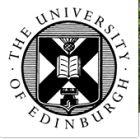The real key word that triggers my rage is the word "energy". When people start talking about positive or negative types, for instance, negative energy — what are you talking about? What do you mean? Let's think about it, what does energy mean? Well, we know what it means, you know, energy from petrol when it's burned and moves a car and makes it move, it's like this. "This room has positive energy." Now, where the fuck is it going, then? It's not moving. It's covering up such woolly thinking, such pathetic nonsense.
Stephen Fry on New Age use of the word "energy".
